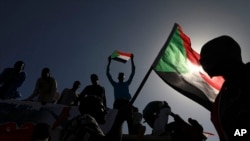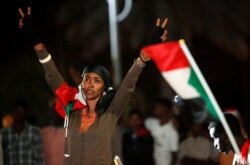A Sudanese court decision sentencing 29 intelligence officers to death for the killing of a protester earlier this year is being welcomed by thousands who rallied against the rule of ousted President Omar al-Bashir.
Protesters blocked the streets leading to the Sudanese court, celebrating death sentences given to 29 national intelligence officers Monday in what they called the first victory after the ouster of former President Omar al-Bashir.
Despite countless demonstrations that ended in clashes, it is the first time in Sudan's history that security officers were ordered to be executed for killing a protester.
Thirteen other defendants were sentenced to prison while four more were acquitted.
While appeals are expected, prosecuting lawyer Mohamed Jouda says the strong sentencing raises confidence in the judicial system after three decades of Bashir’s authoritarian rule.
He says now they’re confident that they’re capable to proceed in the cases on the table of Sudan’s judiciary. They trust that the system is now capable to judge in a professional way, he says, and they’ll provide convincing and complete trials.
The victim, teacher Ahmed Al-Khair, lived in Eastern Sudan. His death was seen as a rallying point in Sudan’s protests that started a year ago against Bashir.
After Khari’s death, demonstrations escalated all over the country for months until the military in April ousted Bashir.
But a deadly June crackdown by security forces on the protesters left dozens of people dead.
The lack of prosecution against security forces raised concerns that justice would remain elusive.
But while those responsible for the crackdown have yet to face justice, Monday’s verdict has given hope to many relatives of victims.
Mohamed Gasim El-Seed’s son was killed when troops cleared the protest camp around army headquarters.
He says the verdict gives them comfort that their sons’ sacrifices will not be wasted. Seed says he expects justice for all protest victims, as long as Sudan’s judiciary restores its sincerity and gets rid of political subordination.
Sudan’s National Intelligence and Security Service was deeply feared during Bashir’s rule.
But Sudan’s public prosecutor last week issued an arrest warrant for former chief of the service, Salah Ghosh, a step welcomed in Sudan as a break from past abuse.
The United States in August banned Ghosh from entering the U.S. over allegations of torture.
The US Embassy in Khartoum welcomed Monday’s verdict, saying on their official Facebook page that Sudan has proven the importance of an independent judicial system.
The protests that led to Bashir’s ouster broke out in December 2018 over skyrocketing prices and a shortage of cash but, quickly morphed into calls for democracy.
After his ouster, a military court earlier this month sentenced Bashir to two years detention for corruption, receiving illegal gifts, and having foreign currency.






